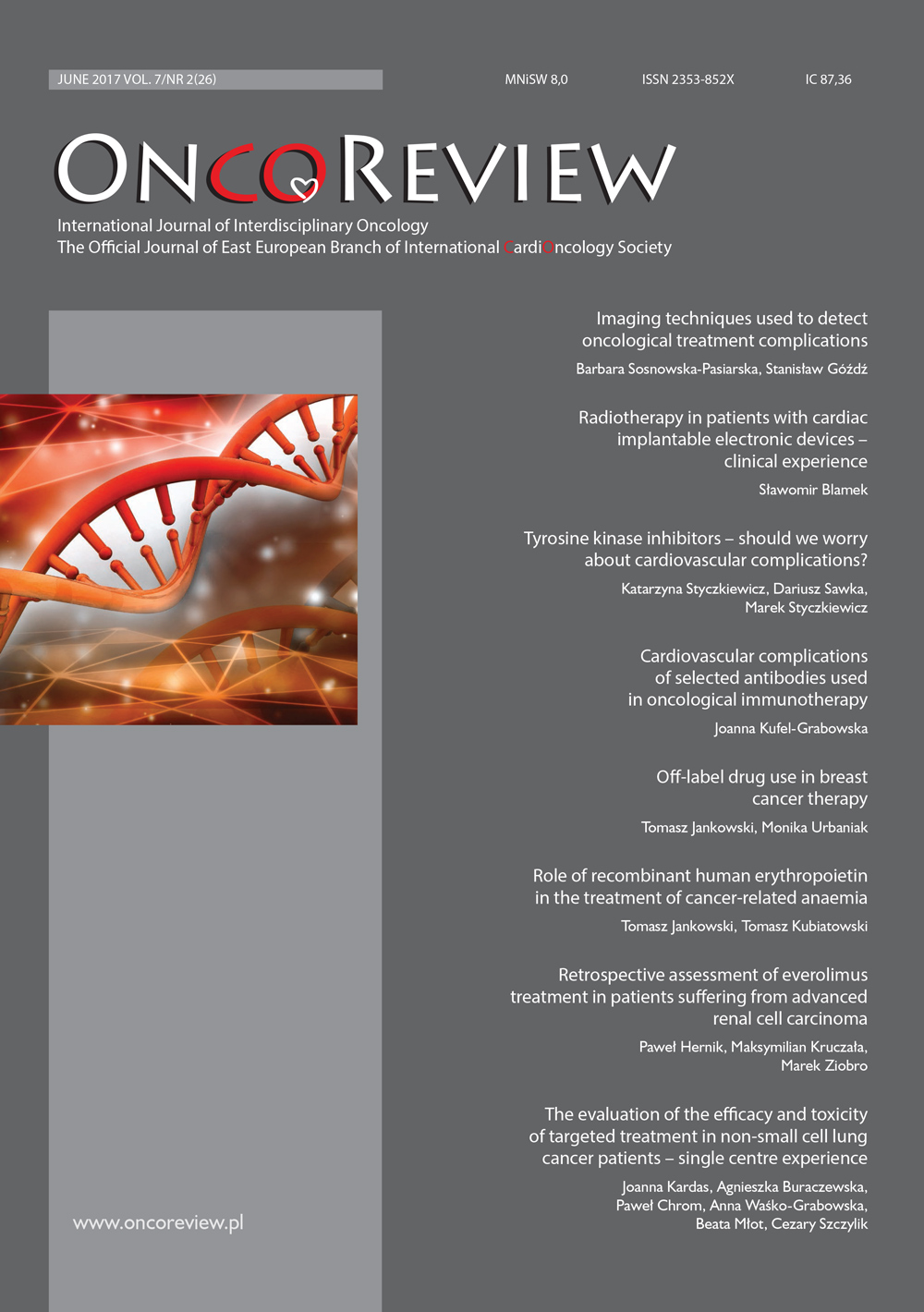The evaluation of the efficacy and toxicity of targeted treatment in non-small cell lung cancer patients – single centre experience Original article
Main Article Content
Abstract
Introduction: Tyrosine kinase inhibitors (TKI) are the standard of treatment in patients with advanced non-small cell lung cancer (NSCLC) with EGFR (endothelial growth factor receptor) gene activating mutation.
Objective: The evaluation of the efficacy and toxicity of TKI drugs in NSCLC patients treated in single centre.
Material and methods: NSCLC patients treated with TKI (gefitinib, erlotynib, afatinib) between 2012– 2016 were retrospectively analysed. We evaluated: overall response rate (ORR) which is the sum of complete responses (CR) and partial remissions (PR), progression free survival (PFS), overall survival (OS) and adverse events (AE) according to CTCAE (Common Terminology Criteria for Adverse Events) scale.
Results: The study group were 16 patients ORR was 50% (CR: 1, PR: 7). Median PFS and OS was 8,7 and 22,9 months respectively. Adverse events observed mainly in stage 1 and 2 were related to hyponatraemia, hyperbilirubinemia, skin toxicity and mucositis. There was one death reported due to infectious complications.
Conclusion: The efficacy and toxicity of TKI in study group were found to be similar to those described in the literature.
Downloads
Metrics
Article Details

This work is licensed under a Creative Commons Attribution-NonCommercial 4.0 International License.
Copyright: © Medical Education sp. z o.o. This is an Open Access article distributed under the terms of the Attribution-NonCommercial 4.0 International (CC BY-NC 4.0). License (https://creativecommons.org/licenses/by-nc/4.0/), allowing third parties to copy and redistribute the material in any medium or format and to remix, transform, and build upon the material, provided the original work is properly cited and states its license.
Address reprint requests to: Medical Education, Marcin Kuźma (marcin.kuzma@mededu.pl)
References
2. Krzakowski M. Nowotwory płuca, opłucnej i śródpiersia. In: Krzakowski M, Potemski P, Warzocha K, Wysocki P (ed.). Onkologia Kliniczna. Via Medica, Gdańsk 2015: 546-553.
3. Schulze WX, Deng L, Mann M. Phosphotyrosine interactome of the ErbB-receptor kinase family. Mol Syst Biol 2005; 1: 2005.0008.
4. Mendelsohn J, Baselga J. Epidermal growth factor receptor targeting in cancer. Semin Oncol 2006; 33(4): 369-385.
5. Rosell R, Carcereny E, Gervais R et al. Erlotinib versus standard chemotherapy as first-line treatment for European patients with advanced EGFR mutation-positive non-small-cell lung cancer (EURTAC): a multicentre, open-label, randomised phase 3 trial. Lancet Oncol 2012; 13: 239-246.
6. Mok TS, Wu YL, Thongprasert S et al. Gefitinib or carboplatin–paclitaxel in pulmonary adenocarcinoma. N Engl J Med 2009; 361: 947-957.
7. Sequist LV, Yang JC, Yamamoto N et al. Phase III study of afatinib or cisplatin plus pemetrexed in patients with metastatic lung adenocarcinoma with EGFR mutations. J Clin Oncol 2013; 31: 3327-3334.
8. Lee JK, Hahn S, Kim DW et al. Epidermal growth factor receptor tyrosine kinase inhibitors vs conventional chemotherapy in non-small cell lung cancer harboring wild-type epidermal growth factor receptor: a meta-analysis. JAMA 2014; 311(14): 1430-1437.
9. Petrelli F, Borgonovo K, Cabiddu M et al. Efficacy of EGFR tyrosine kinase inhibitors in patients with EGFR mutated non-small cell lung cancer: a meta-analysis of 13 randomised trials. Clinical Lung Cancer 2012; 13: 107-114.
10. Krzakowski M. Nowotwory płuca, opłucnej i śródpiersia. In: Krzakowski M, Potemski P, Warzocha K, Wysocki P (ed.). Onkologia Kliniczna. Via Medica, Gdańsk 2015: 557-558.
11. Zhang Y, Sheng J, Yang Y et al. Optimized selection of three major EGFR-TKIs in advanced EGFR-positive non small cell lung cancer: a network metaanalysis. Oncotarget 2016; 7(15): 20104.
12. Krzakowski M, Jassem J. Zasady oceny wartości leczenia systemowego w onkologii. In: Krzakowski M. (ed.) Onkologia kliniczna. Borgis Wydawnictwo Medyczne, Warszawa 2006: 655-656.
13. Eisenhauer EA, Therasse P, Bogaerts J et al. New response evaluation criteria in solid tumours: revised RECIST guideline (version 1.1). Eur J Cancer 2009; 45(2): 228-247.
14. Schemper M, Smith TL. A note on quantifying follow-up in studies of failure time. Control Clin Trials 1996; 17: 343-346.
15. Common Terminology Criteria for adverse events (Version 4.0). Online: http://evs.nci.nih.gov/ftp1/CTCAE/CTCAE_4.03_2010-06-14_QuickReference_5x7.pdf.
16. Rosell R, Moran T, Queralt C et al. Screening for epidermal growth factor receptor mutations in lung cancer. N Engl J Med 2009; 361(10): 958-967.
17. Zhou C, Wu YL, Chen G et al. Erlotinib versus chemotherapy as first-line treatment for patients with advanced EGFR mutation-positive non-smallcell lung cancer (OPTIMAL, CTONG-0802): a multicentre, open-label, randomised, phase 3 study. Lancet Oncol 2011; 12(8): 735-742.
18. Schiller JH, Harrington D, Belani CP et al. Comparison of four chemotherapy regimens for advanced non small-cell lung cancer. N Engl J Med 2002; 346(2): 92-98.
19. Shepherd FA, Rodrigues Pereira J, Ciuleanu T et al. Erlotinib in previously treated non-small-cell lung cancer. N Engl J Med 2005; 353(2): 123-132.
20. Thatcher N, Chang A, Parikh P et al. Gefitinib plus best supportive care in previously treated patients with refractory advanced non-small-cell lung cancer: results from a randomised, placebo-controlled, multicentre study (Iressa Survival Evaluation in Lung Cancer). Lancet 2005; 366(9496): 1527-1537.
21. Sequist LV, Soria JC, Goldman JW et al. Rociletinib in EGFR-mutated non-small-cell lung cancer. N Engl J Med 2015; 372(18): 1700-1709.
22. Mok TS, Wu YL, Ahn MJ et al. Osimertinib or Platinum-Pemetrexed in EGFR T790M-Positive Lung Cancer. N Engl J Med 2017; 376(7): 629-640.
23. Product characteristic: Tarceva. Online: http://ec.europa.eu/health/documents/community-register/2005/200509199999/anx_9999_pl.pdf.
24. Okyuama T, Akazawa Y, Uchida J et al. Subacute transient encephalopathy induced by erlotinib. Oncol Res 2011; 19(8-9): 399-402.

